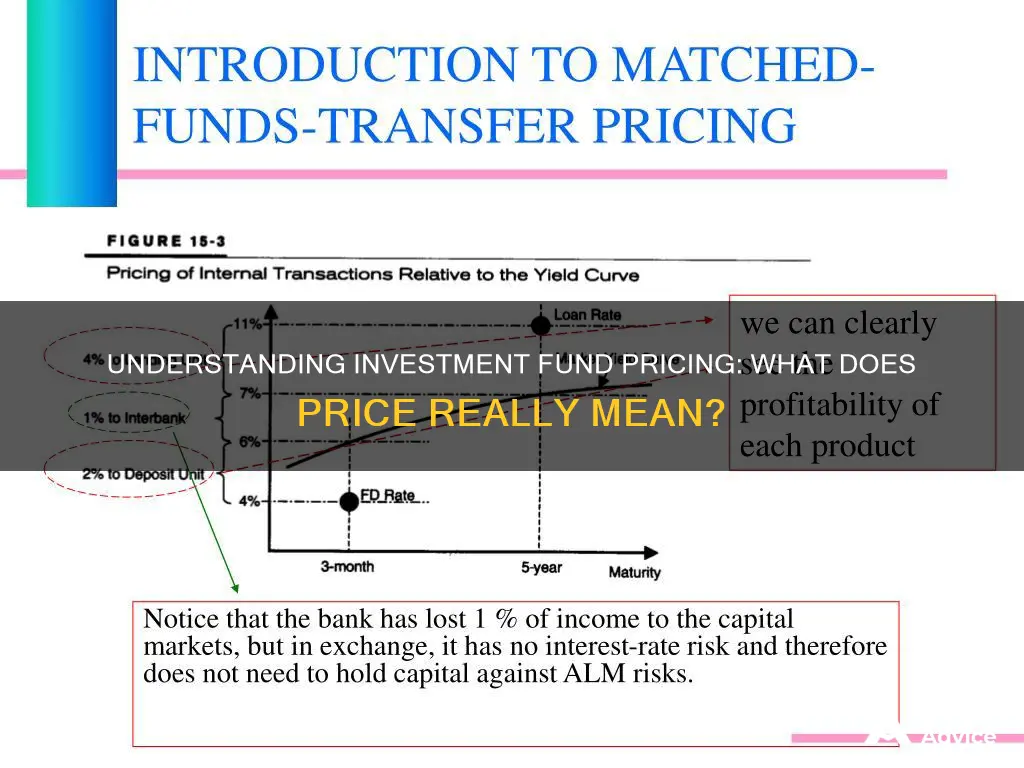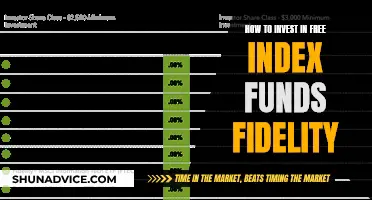
The price of an investment fund is typically referred to as its net asset value (NAV). The NAV is calculated by subtracting the fund's liabilities from the value of its assets. This value is then divided by the number of shares outstanding to determine the NAV per share (NAVPS). The NAV is usually updated once a day after the markets close.
The price of a mutual fund, a type of investment fund, is determined by its NAV per share. When buying a unit or share of a mutual fund, an investor gets a part of its portfolio value. The value of a mutual fund depends on the performance of the securities it invests in.
| Characteristics | Values |
|---|---|
| Definition | The price per share of a mutual fund |
| Calculation | Net asset value (NAV) |
| NAV Calculation | Total assets - liabilities / number of shares outstanding |
| NAV Update Frequency | Once a day, usually after markets close |
| Price Update Frequency | Once a day, usually after markets close |
| Price Influencing Factors | Performance of the securities the fund invests in |
What You'll Learn

Net Asset Value (NAV)
NAV is often expressed on a per-share basis, which is calculated by dividing the NAV by the number of shares outstanding. This per-share NAV is the price at which shares of the fund are traded.
NAV is most commonly used with mutual funds and unit investment trusts, and it can change daily. For these types of funds, the per-share NAV is the exact price an investor will pay to buy or sell shares, subject to any applicable fees.
NAV is an important metric for investors as it provides a way to determine the value of their shares. It is also used to assess fund performance, although this can be misleading as it does not account for distributions to shareholders.
The formula for calculating NAV is:
NAV = (Assets - Liabilities) / Total shares outstanding
Best Direct Mutual Fund Investment Apps: Your Guide
You may want to see also

Expense ratio
When investing in mutual funds or exchange-traded funds (ETFs), one of the most important factors to consider is the expense ratio. An expense ratio is an annual fee that investors pay to cover a fund's operating expenses, such as management and marketing. It is calculated as a percentage of the fund's average net assets and is deducted from the fund's total value on a regular basis. This means that expense ratios are not itemised on account statements or confirmations, so they can be easy to miss.
The expense ratio for a fund with an average net asset value of $10,000 and expenses of $47,000 would be 0.47%. This is equivalent to $47 for every $10,000 invested. A fund with an expense ratio of 1% would cost an investor $10 per year for every $1,000 invested.
The expense ratio formula is:
> Expense ratio = Annual fund expenses / Total assets under management
For example, if a fund spends $100,000 a year on operating costs and has $10,000,000 in assets, the expense ratio would be 0.01 or 1%.
Invest Wisely: Graphene Mutual Funds for Beginners
You may want to see also

Sales charges or loads
Sales charges, or loads, are fees investors pay when they buy (front-end load) or redeem (back-end load) shares in a mutual fund. These fees are similar to a commission and are paid to the financial intermediary, such as a broker, financial planner, or investment advisor, responsible for the transaction.
Sales charges are typically charged as a fixed percentage of the trade's value, with most loads falling within a 3% to 6% range. The maximum sales charge allowed by regulation is 8.5%.
Front-end sales charges are paid as a percentage of the purchase price at the time of investment, while back-end sales charges are paid as a percentage of the selling price at the time of sale. Deferred sales charges are back-end sales charges that decline over time, often reaching zero. They are also called contingent deferred sales charges because the fee depends on the holding period.
Sales charges are not the only fees associated with mutual funds. There are also account fees, exchange fees, purchase fees, redemption fees, and trading costs.
Investors can avoid sales charges by investing in no-load funds, which market directly to the public and have no salespeople. Exchange-traded funds (ETFs) are also not subject to sales charges.
Mid-Cap Funds: Smart Investment for Long-Term Growth
You may want to see also

Redemption fees
The benefits of redemption fees include minimising short-termism and protecting other investors from higher transaction costs. By charging a redemption fee, the fund can maintain lower cash positions and operating expenses. The Securities and Exchange Commission (SEC) generally limits redemption fees to 2% of the sales amount.
It is important for investors to understand all the fees associated with mutual funds, including redemption fees, sales loads, 12b-1 fees, and account service fees, to protect their potential returns.
Investment Banking vs. Hedge Funds: Why Choose Banks?
You may want to see also

Other account fees
Investment fees are charged to use financial products and services. They can be structured as either one-time charges or recurring fees that are charged as a percentage of the funds in your investing account. Here are some common types of other account fees:
Account Fees
Account fees are charges that may be incurred for maintaining an investment account. These can include monthly or annual maintenance fees, as well as fees for specific services or transactions. Some common types of account fees include:
- Maintenance fees: These are fees charged by the investment firm or brokerage to cover the cost of maintaining your account. These fees may be charged monthly, quarterly, or annually, and are typically based on a percentage of the funds in your account.
- Inactivity fees: In some cases, investment firms may charge inactivity fees if your account remains dormant for a certain period. These fees are intended to encourage investors to actively use their accounts and generate revenue for the firm.
- Minimum account balance fees: Some investment firms may require you to maintain a minimum account balance. If your account falls below this threshold, you may be charged a fee. This fee is intended to encourage investors to maintain a certain level of investment with the firm.
- Transfer fees: If you decide to transfer your investment funds to another firm or initiate a wire transfer, you may be charged a transfer fee. These fees can vary depending on the amount being transferred and the method of transfer.
- Account closure fee: Some investment firms may also charge a fee for closing your account. This fee is typically separate from any transfer fees and is intended to cover the administrative costs associated with closing your account.
It is important to carefully review the fee schedule and terms and conditions before opening an investment account to understand the specific account fees that may be charged. These fees can impact your overall investment returns and should be considered when making investment decisions.
A Beginner's Guide to Mutual Fund Investment
You may want to see also
Frequently asked questions
In the context of investment funds, the price of a fund is typically referred to as the Net Asset Value (NAV). The NAV is calculated by taking the total value of the fund's assets, subtracting its liabilities, and then dividing that figure by the number of shares outstanding. The resulting NAV is usually updated once a day after the markets close.
The NAV includes the value of the fund's assets, such as stocks, bonds, cash, and other investments, minus any liabilities or debts owed by the fund.
The Net Asset Value of a fund is typically updated once a day after the markets close. This means that the price of a fund, or the NAV, can fluctuate daily based on the performance of the fund's underlying assets.
To buy or sell shares of an investment fund, you will typically need to go through a broker or investment platform. You will need to open an account, deposit funds, and then place a buy or sell order for the desired number of shares.
There are several fees associated with investment funds, including expense ratios, sales charges or loads, redemption fees, and account fees. The expense ratio is an annual fee that covers the fund's operating expenses, while sales charges or loads are fees charged when buying or selling shares. Redemption fees are charged when selling shares within a certain period, and account fees may be charged for maintaining an account balance below a minimum threshold.
The price of an investment fund, or the Net Asset Value, is typically listed on brokerage platforms and is updated at the end of each trading day. This price is used to buy or sell shares of the fund, and it reflects the value of the fund's underlying assets.







